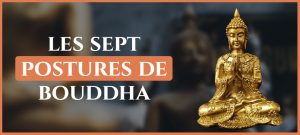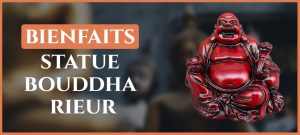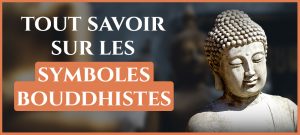Vous cherchez quelles sont les 10 règles du bouddhisme ? Alors vous êtes au bon endroit. Dans cet article, vous découvrirez les 10 préceptes que les moines bouddhistes doivent accepter.
Pour les appliquer, vous n’avez pas besoin de vous convertir en moine. Vous allez voir que ces règles sont facilement applicables à votre vie de tous les jours. En les suivants, vous respecterez toute forme de vie, ainsi vous améliorerez votre Karma.
Les 5 premières règles sont respectées par tous les « laymans », autrement dit par le peuple. Quant aux moines, ils respectent ces 5 règles et les 5 suivantes que je vais vous révéler dans cet article.
Je vous conseille de lire cet article jusqu’au bout car les derniers préceptes sont très importants.
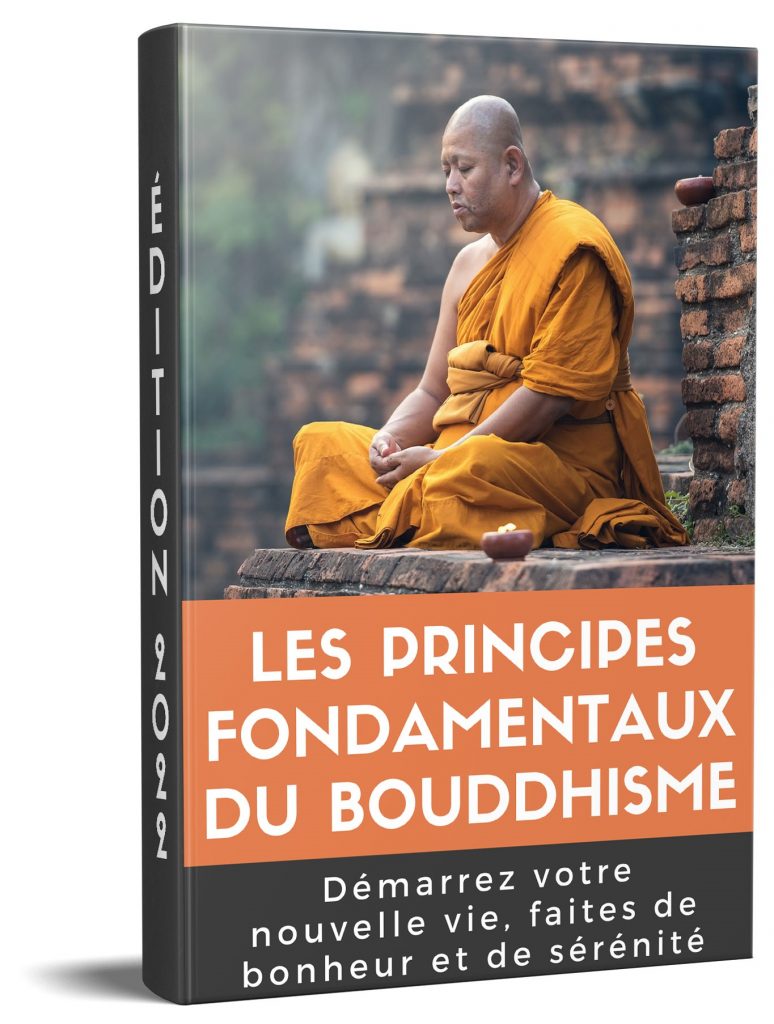
Découvrez comment appliquer les principes fondamentaux du bouddhisme afin d’avoir une vie plus heureuse et épanouie.
17,00€ GRATUIT
Les 5 règles bouddhistes fondamentales
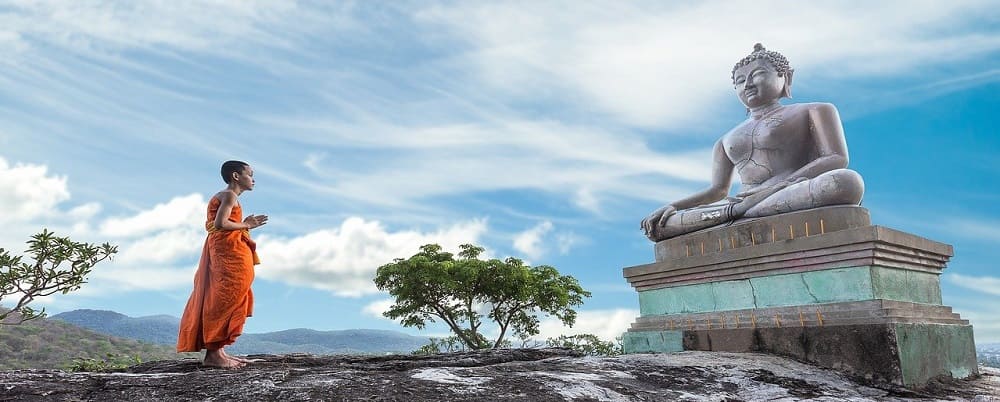
1. Panatipata veramani sikkhapadam samadiyami
Cette première règle du bouddhisme nous invite à ne pas tuer les autres êtres vivants. Toute forme de vie doit être respectée et nous ne devons pas nous considérer comme des êtres supérieurs.
Pour respecter ce précepte, vous devez donc éviter au maximum de manger de la viande et du poisson afin de ne pas être complice de ces meurtres de masse. Si vous êtes déjà végétarien (ou végan), alors vous respectez déjà pleinement cette règle.
Cette règle est la première car elle est fondamentale pour que les êtres humains puissent vivre en harmonie et en paix. C’est quelque chose de très basique, mais d’indispensable.
2. Adinnadana veramani sikkhapadam samadiyami
Cette phrase peut se traduire littéralement par « j’entreprends le précepte de ne pas prendre ce qui n’est pas donné ». C’est donc une règle pour interdire aux humains de voler.
La propriété d’autrui doit être respectée. Cette règle du bouddhisme fait également partie des fondamentaux de la vie en société.
Vous vous engagez à ne rien voler, même s’il s’agit d’un objet à faible valeur, c’est un acte qui doit être proscrit. Cela permet de vivre en confiance avec les personnes qui nous entourent.
Cette règle nous invite également à limiter nos désirs et à ne pas envier notre voisin. En effet, les désirs matérialistes sont une source d’insatisfaction éternelle. Il faut donc apprendre à les maitriser et comprendre que le bonheur se trouve en soi, pas dans les possessions.
3. Abrahmacariya veramani sikkhapadam samadiyami
Cette 3ème règle du bouddhisme concerne le contrôle de ses désirs sexuels. Vous ne devez pas suivre vos pulsions sexuelles ni être guidé par vos désirs. Si vous souhaitez incarner pleinement ce précepte, l’abstinence est la clé.
Vous pouvez pratiquer l’abstinence pendant une période de 30 jours par exemple. Puis au fil du temps, augmentez cette période afin de progresser. Bien sûr, vous n’êtes pas un moine bouddhiste, vous n’avez donc pas besoin de renoncer entièrement à votre vie sexuelle. Tout est une question de contrôle.
Cette règle est stipulée dans les enseignements de Bouddha afin d’éviter les viols et autres abus sexuels.
4. Musavada veramani sikkhapadam samadiyami
Ce précepte nous invite à nous abstenir de tout discours incorrect. C’est donc une règle qui nous interdit de mentir. Même si toute vérité n’est pas bonne à dire, vous ne devez jamais songer à mentir.
Le mensonge est un acte qui aura des conséquences négatives dans votre vie sur le long terme. Votre entourage n’aura plus confiance en vous et votre parole n’aura plus de crédibilité.
Pour maintenir des relations saines avec vos proches, il est important de suivre cette 4ème règle du bouddhisme et donc de dire la vérité.
5. Suramerayamajja pamadatthana veramani sikkhapadam samadiyami
Cette règle stipule que vous ne devez pas consommer d’aliments ou de boissons qui altèrent votre esprit et votre confiance. C’est donc un précepte qui interdit la consommation de drogues ou d’alcool.
Cette règle permet deux choses :
- Vous éviter de détruire votre santé et votre conscience avec des substances qui sont nocives et qui n’apporteront rien de positif à votre vie. En effet, nous pouvons être tenté de fuir certains problèmes en consommant des drogues. Mais, la drogue ne les fera pas disparaitre, au contraire elle va les empirer.
- Le bouddhisme étant une religion qui invite au contrôle de soi et de ses émotions, les drogues sont proscrites car elles créent une addiction très difficile à contrôler. De plus, elles altèrent notre conscience et modifie nos émotions, ce qui va à l’encontre des principes bouddhistes.
Les règles du bouddhisme respectées par les moines
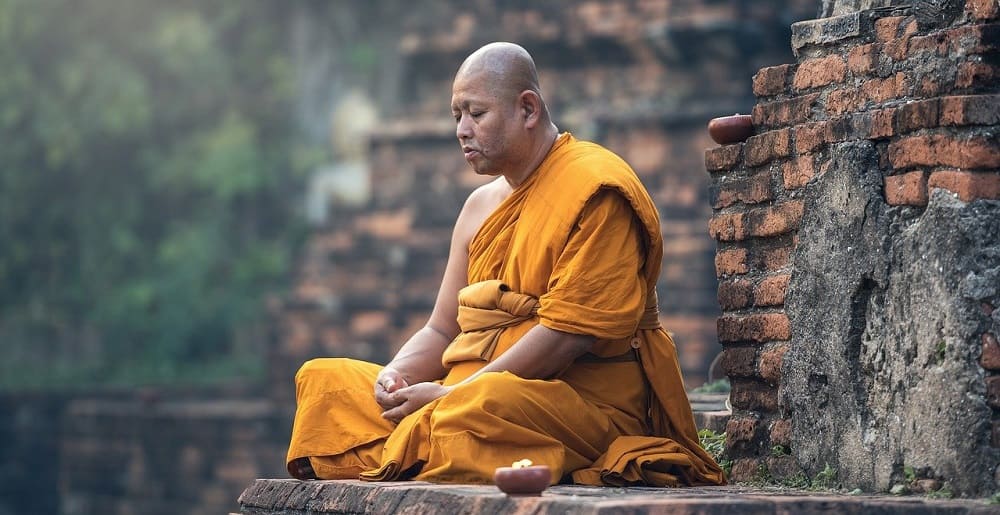
Nous avons donc vu les 5 règles fondamentales suivies par tous les pratiquants du bouddhisme. Vous voyez que ce sont des principes très basiques que vous appliquiez surement avant de les connaître. Si tous les humains les respectaient, cela permettrait de vivre en harmonie et d’améliorer le bien-être de chacun.
Voyons maintenant les 5 autres règles afin que vous connaissiez les 10 règles du bouddhisme.
6. Vikalabhojana veramani sikkhapadam samadiyami
Ce précepte bouddhiste nous interdit de manger l’après-midi. En effet, les moines bouddhistes ont le droit de se nourrir seulement de l’aube jusqu’à 12h. Ensuite, il passe le reste de la journée sans se nourrir et s’endorme le ventre vide.
Ce jeun est valable uniquement pour les moines en bonne santé et qui sont en pays chauds. Dans les cas contraires, cette règle peut être adaptée et modifiée.
Cette courte période de jeûne quotidienne permet d’améliorer la santé et le bien-être. En effet, les organes digestifs sont moins stimulés, ils sont donc préservés et cela permet également d’augmenter notre niveau d’énergie.

Découvrez comment appliquer les principes fondamentaux du bouddhisme afin d’avoir une vie plus heureuse et épanouie.
17,00€ GRATUIT
7. Nacca-gita-vadita-visuka-dassana veramani sikkhapadam samadiyami
Voici comment cette 7ème règle du bouddhisme se traduit : « J’entreprends le précepte de m’abstenir de danser, de chanter, de musique, d’aller voir des spectacles. ». Elle invite donc à limiter les divertissements afin de se concentrer sur la pratique du bouddhisme, la méditation et autres rituels religieux.
Les divertissements détournent les moines de leurs causes et de leurs objectifs de vie, c’est pourquoi ils doivent être limité. Mais en réalité, cette règle n’interdit pas complétement aux moines de se divertir. Tout est une question de dosage et de contrôle. Certains moines assistent donc à des spectacles mais ils consomment le divertissement avec parcimonie.
8. Mala-gandha-vilepana-dharana-mandana-vibhusanatthana veramani sikkhapadam samadiyami
Cette règle aborde le culte du corps et interdit donc de porter des bijoux, du parfum ou tout autres objets ayant pour but d’embellir le corps. Les moines ne doivent pas être tentés par la séduction, tout ce qui vise à sublimer le corps doit donc être proscrits.
De plus, il faut respecter notre corps et ne pas chercher à le modifier ou à l’améliorer. Cette règle prône l’acceptation de soi sans artifices. Tel le Bouddha rieur qui s’acceptait malgré son gros ventre, chaque humain doit accepter son corps et son physique.
Mais si vous aimez porter des bijoux, vous pouvez découvrir nos bracelets bouddhistes 😉.
9. Uccasayana-mahasayana veramani sikkhapadam samadiyami
Ce précepte indique aux moines qu’ils ne doivent pas dormir dans un couchage luxueux ou s’installer dans une place plus haute que des être nobles. La hiérarchie doit donc être respectée.
Les moines dorment donc tous au même niveau de hauteur car ils sont tous égaux. Mais les personnes plus anciennes ou plus sages doivent dormir dans des couchages en hauteur.
Cette règle invite les moines à être respectueux de leurs ainés et à rester humble.
10. Jatarupa-rajata-patiggahana veramani sikkhapadam samadiyami
On arrive maintenant à la 10ème règle du bouddhisme. Il s’agit de ne pas accepter et de ne pas utiliser l’or ou l’argent.
Lorsque l’on fait une offrande à un moine bouddhiste, les pièces ne doivent se passer de main à main. C’est pourquoi elles sont déposées sur une table devant les moines. Les dotations peuvent également se faire dans une enveloppe afin d’éviter le contact direct avec l’argent.
Nous avons donc vu les 10 règles du bouddhisme qui sont respectées par les moines. Mais en réalité, il y a beaucoup plus de préceptes qui sont suivis par ces pratiquants du bouddhisme. En effet, on recense 227 règles délivrées par Bouddha.
Allez-vous appliquer les 10 règles du bouddhisme ?

Maintenant que vous avez découvert les 10 règles du bouddhisme, comment allez vous les appliquer dans votre vie ?
Les 5 premiers préceptes sont respectés par la plupart des humains puisqu’on les retrouve dans les différents textes de lois. Mais les 5 règles suivantes peuvent être plus compliquées à respecter.
En effet, de nos jours le divertissement tient une grande place dans notre société, cela peut donc être compliqué d’y renoncer. Pour ce qui est de la 8ème règle, c’est également difficile de l’appliquer pleinement dans une société ou le physique et l’esthétique comptent de plus en plus.
Vous pouvez donc appliquer ces préceptes à petites doses afin de ne pas être brusqué par des changements radicaux dans votre vie. Vous pourrez ensuite progresser et respecter pleinement les 10 règles du bouddhisme si c’est votre souhait.
Mais ces règles visent avant tout le bonheur et le bien-être. Vous ne devez pas être dans la souffrance en les appliquant, cela doit être un choix. Donc, n’oubliez pas que votre bonheur passe avant tout.
C’est maintenant la fin de cet article, j’espère qu’il vous aura aidé à en savoir plus sur les 10 préceptes bouddhistes.
Vous pouvez partager votre avis dans l’espace commentaire ou faire un tour sur notre boutique en ligne si vous cherchez une décoration ou des bijoux bouddhistes.

Découvrez comment appliquer les principes fondamentaux du bouddhisme afin d’avoir une vie plus heureuse et épanouie.
17,00€ GRATUIT


